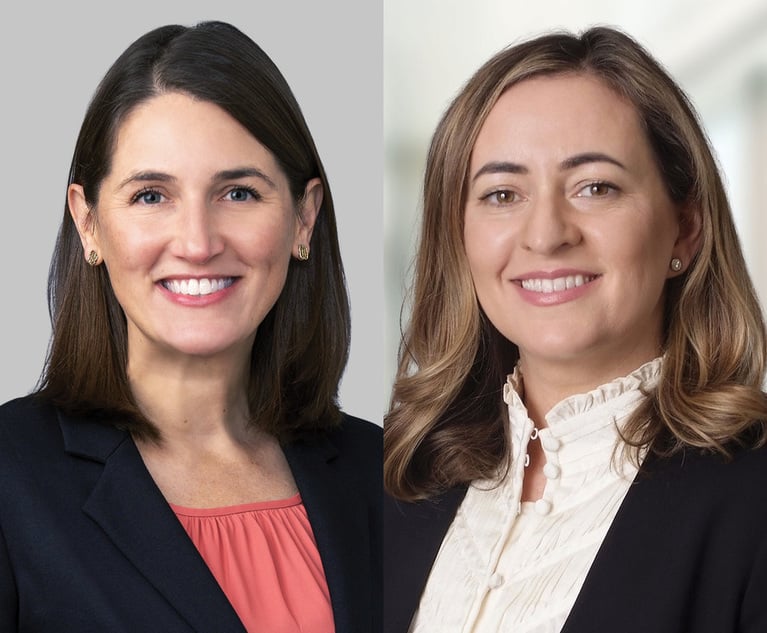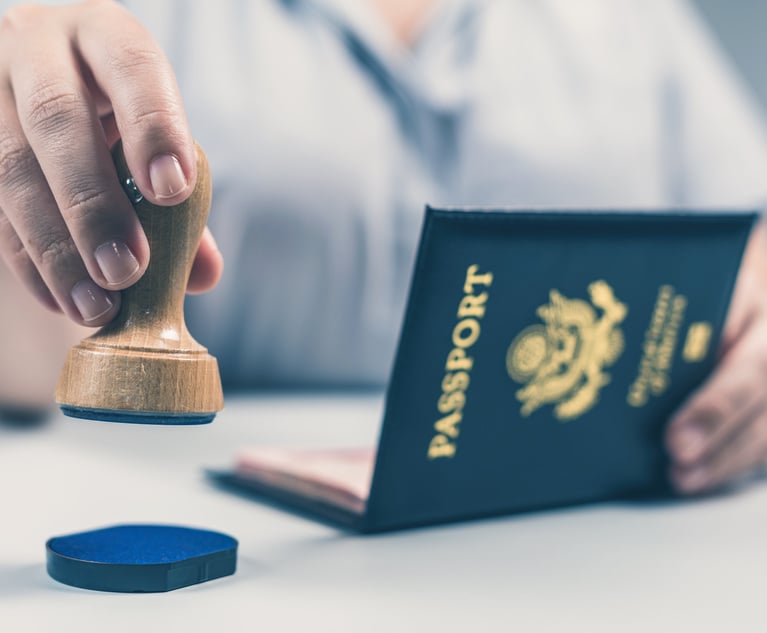 Photo: Champion studio/Shutterstock.com
Photo: Champion studio/Shutterstock.comGood News for Debtor Counsel: Ruling Allows Reimbursement in Bankruptcy Cases
The appeal resolves a dispute involving “no-money-down" business models, where debtors' attorneys advance their clients money to cover fees for court filings, credit counseling and credit reports.
May 15, 2019 at 03:30 PM
4 minute read
A recent U.S. Court of Appeals for the Fifth Circuit ruling will benefit access to justice for low-income people who seek Chapter 13 bankruptcy relief, and the consumer debt attorneys who represent them.
The question in the case was whether a bankruptcy court is allowed to reimburse debtor attorneys who pay certain fees up front on behalf of their clients, and later in the bankruptcy, seek fee reimbursements from the estate. A district court had ruled that the law prohibits some fee reimbursements, but the Fifth Circuit disagreed.
“That call remains within the discretion of each bankruptcy court, which is permitted—but not required—to authorize it for any given case,” said the May 13 opinion in McBride v. Riley.
Brad Drell, director of Gold, Weems, Bruser, Sues & Rundell in Alexandria, Louisiana, said the ruling impacts consumer debt lawyers who represent individuals.
“These tend to be the poorest of the poor. Essentially, what they're trying to do is front the costs for the client, like any lawyer would do in any case,” Drell said, noting that such lawyers' business model relies on the fee reimbursements during the bankruptcy.
“It does open the door for more people to obtain Chapter 13 relief. This is a critical access-to-justice issue,” he said. “It will allow lawyers to expand their practices.”
The appeal resolves a dispute between the Bankruptcy Court for the Western District of Louisiana, represented by two Chapter 13 trustees, against Chapter 13 debtor's attorneys involving “no-money-down business models” where a debtor's attorney advances the client's fees for filing, credit counseling and credit reports.
The appellants, Thomas McBride and his law firms, Joseph Moore and E. Orum Young Law, argue they should get reimbursement of these fees, along with their compensation under the bankruptcy court's “no-look fee” arrangement, a process many bankruptcy courts use to fast-track the lawyer-compensation process for routine cases.
The bankruptcy court found the fees are not reimbursable under the court's no-look fee standing order. It also decided debtor's counsel could not get reimbursed for advancing the costs because 11 U.S.C. §§503(b) and 330 only allow debtor's lawyers to get reasonable compensation, and not reimbursements.
The order simultaneously denied reimbursement requests in 18 other pending cases.
McBride and two other debtor's counsel in affected cases appealed the order to the district court, which affirmed the bankruptcy court. Then they appealed to the Fifth Circuit.
If the Fifth Circuit would have allowed the Louisiana bankruptcy court's ruling to stand, it would have invalidated local rules that currently allow fee reimbursements in bankruptcy courts in the Southern and Northern Districts of Texas and two in Mississippi, noted the opinion.
The Fifth Circuit found the bankruptcy court correctly interpreted its own no-look fee standing order, but erred in finding that bankruptcy courts always lack discretion to reimburse the fees.
“We reject that conclusion as a matter of statutory interpretation and vacate that portion of the judgment,” said the opinion.
The statute in question gives courts discretion to award lawyers reasonable compensation, based on the benefit and necessity of the legal services for the debtor, said the opinion. The Fifth Circuit found that filing, credit counseling and credit report fees are necessary to represent debtors' interests, and that the law gives courts discretion to compensate lawyers for such costs.
Dana Kaersvang, an appellate attorney in the U.S. Department of Justice's Civil Division, who represented acting U.S. Bankruptcy Trustee David Asbach in the case, declined to comment.
This content has been archived. It is available through our partners, LexisNexis® and Bloomberg Law.
To view this content, please continue to their sites.
Not a Lexis Subscriber?
Subscribe Now
Not a Bloomberg Law Subscriber?
Subscribe Now
NOT FOR REPRINT
© 2024 ALM Global, LLC, All Rights Reserved. Request academic re-use from www.copyright.com. All other uses, submit a request to [email protected]. For more information visit Asset & Logo Licensing.
You Might Like
View All
'Never Been More Dynamic': Big Law Leaders Reflect on 2024 and Expectations Next Year
7 minute read

Business Immigration Practices Brace for ‘Dramatic’ Changes Under Second Trump Presidency

Trump Mulls Big Changes to Banking Regulation, Unsettling the Industry
Trending Stories
- 1Senate Confirms Last 2 of Biden's California Judicial Nominees
- 2Morrison & Foerster Doles Out Year-End and Special Bonuses, Raises Base Compensation for Associates
- 3Tom Girardi to Surrender to Federal Authorities on Jan. 7
- 4Husch Blackwell, Foley Among Law Firms Opening Southeast Offices This Year
- 5In Lawsuit, Ex-Google Employee Says Company’s Layoffs Targeted Parents and Others on Leave
Who Got The Work
Michael G. Bongiorno, Andrew Scott Dulberg and Elizabeth E. Driscoll from Wilmer Cutler Pickering Hale and Dorr have stepped in to represent Symbotic Inc., an A.I.-enabled technology platform that focuses on increasing supply chain efficiency, and other defendants in a pending shareholder derivative lawsuit. The case, filed Oct. 2 in Massachusetts District Court by the Brown Law Firm on behalf of Stephen Austen, accuses certain officers and directors of misleading investors in regard to Symbotic's potential for margin growth by failing to disclose that the company was not equipped to timely deploy its systems or manage expenses through project delays. The case, assigned to U.S. District Judge Nathaniel M. Gorton, is 1:24-cv-12522, Austen v. Cohen et al.
Who Got The Work
Edmund Polubinski and Marie Killmond of Davis Polk & Wardwell have entered appearances for data platform software development company MongoDB and other defendants in a pending shareholder derivative lawsuit. The action, filed Oct. 7 in New York Southern District Court by the Brown Law Firm, accuses the company's directors and/or officers of falsely expressing confidence in the company’s restructuring of its sales incentive plan and downplaying the severity of decreases in its upfront commitments. The case is 1:24-cv-07594, Roy v. Ittycheria et al.
Who Got The Work
Amy O. Bruchs and Kurt F. Ellison of Michael Best & Friedrich have entered appearances for Epic Systems Corp. in a pending employment discrimination lawsuit. The suit was filed Sept. 7 in Wisconsin Western District Court by Levine Eisberner LLC and Siri & Glimstad on behalf of a project manager who claims that he was wrongfully terminated after applying for a religious exemption to the defendant's COVID-19 vaccine mandate. The case, assigned to U.S. Magistrate Judge Anita Marie Boor, is 3:24-cv-00630, Secker, Nathan v. Epic Systems Corporation.
Who Got The Work
David X. Sullivan, Thomas J. Finn and Gregory A. Hall from McCarter & English have entered appearances for Sunrun Installation Services in a pending civil rights lawsuit. The complaint was filed Sept. 4 in Connecticut District Court by attorney Robert M. Berke on behalf of former employee George Edward Steins, who was arrested and charged with employing an unregistered home improvement salesperson. The complaint alleges that had Sunrun informed the Connecticut Department of Consumer Protection that the plaintiff's employment had ended in 2017 and that he no longer held Sunrun's home improvement contractor license, he would not have been hit with charges, which were dismissed in May 2024. The case, assigned to U.S. District Judge Jeffrey A. Meyer, is 3:24-cv-01423, Steins v. Sunrun, Inc. et al.
Who Got The Work
Greenberg Traurig shareholder Joshua L. Raskin has entered an appearance for boohoo.com UK Ltd. in a pending patent infringement lawsuit. The suit, filed Sept. 3 in Texas Eastern District Court by Rozier Hardt McDonough on behalf of Alto Dynamics, asserts five patents related to an online shopping platform. The case, assigned to U.S. District Judge Rodney Gilstrap, is 2:24-cv-00719, Alto Dynamics, LLC v. boohoo.com UK Limited.
Featured Firms
Law Offices of Gary Martin Hays & Associates, P.C.
(470) 294-1674
Law Offices of Mark E. Salomone
(857) 444-6468
Smith & Hassler
(713) 739-1250






